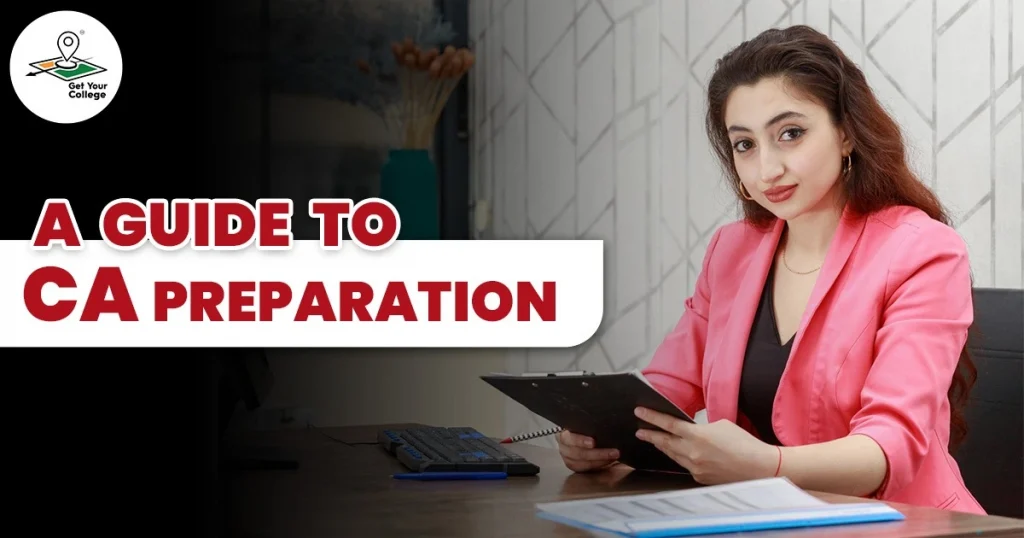Becoming a Chartered Accountant (CA) stands as an achievement, dedication, persistence, and strategic planning. Aspiring CAs undertake an arduous journey marked by rigorous study and practical training to cultivate the essential expertise and insights needed to excel in the realms of accounting and finance.
This blog delves into the indispensable elements of CA preparation, ranging from comprehending the intricate exam patterns and exhaustive syllabi to making judicious choices regarding enrollment in coaching classes. Understanding the exam format and syllabus is crucial, as it sets the groundwork for focused preparation.
Mastery of subjects encompassing accounting principles, financial management, taxation, and auditing is indispensable. Moreover, aspiring CAs must grasp the nuances of practical applications alongside theoretical concepts. While self-study remains an option, many candidates opt for structured coaching classes to augment their learning experiences under the guidance of seasoned professionals. These classes offer structured curriculum, personalized attention, and valuable resources, fostering comprehensive preparation and boosting confidence levels.
Ultimately, by navigating through these essentials with diligence and foresight, aspirants can make their path towards achieving the esteemed CA designation, marking the onset of a rewarding career in the financial domain.
CA: A Brief Overview
Administered by the Institute of Chartered Accountants of India (ICAI), the Chartered Accountancy (CA) course enjoys global recognition for its rigorous curriculum and professional standards. It is structured into three levels: Foundation, Intermediate, and Final.
Each level aims to evaluate candidates’ proficiency across diverse domains such as accounting, auditing, taxation, and financial management.
The Foundation level serves as an entry point, providing fundamental knowledge and skills. Intermediate builds upon this foundation, delving deeper into specialized areas. Finally, the Final level represents the culmination of the CA journey, assessing candidates’ comprehensive understanding and readiness to become Chartered Accountants.
This structured approach ensures that aspiring CAs acquire a robust understanding of core concepts and develop the expertise necessary to excel in the field.
Exam Pattern
The CA exams are conducted twice a year, typically in May and November, and follow a structured pattern tailored to each level. The exams consist of multiple-choice questions (MCQs) as well as subjective questions that test candidates’ conceptual understanding and analytical skills. Additionally, the Final level includes a practical training component that evaluates candidates’ ability to apply theoretical knowledge in real-world scenarios.
Exam Syllabus
The CA syllabus is vast and encompasses a wide range of topics across accounting, auditing, taxation, financial reporting, and corporate laws. Candidates are required to develop a comprehensive understanding of each subject and stay updated with the latest regulatory changes and industry developments. Diligent study and regular practice are essential to mastering the syllabus and achieving success in the exams.
The Chartered Accountancy (CA) course, administered by the Institute of Chartered Accountants of India (ICAI), is esteemed globally for its rigorous curriculum and professional standards.
It consists of four key stages: Foundation, Intermediate, Articleship, and Final, each serving distinct purposes in shaping aspiring CAs into adept professionals.
1. Foundation Course:
The Foundation course marks the entry-level stage for aspiring CAs. It aims to provide a solid grounding in fundamental concepts of accounting, economics, mathematics and business communication. This level serves as a prerequisite for advancing to the Intermediate stage. The Foundation course comprises four papers:
- Principles and Practices of Accounting
- Business Laws
- Business Mathematics
- Business Economics and Business
2. Intermediate Course:
Following successful completion of the Foundation course, candidates progress to the Intermediate stage. Here, they delve deeper into specialized areas of accounting, auditing, taxation, and finance. The Intermediate course is divided into two groups, each comprising four papers, totaling eight papers:
Group I:
- Accounting
- Corporate Laws and Other Laws
- Cost and Management Accounting
- Taxation
Group II:
- Advanced Accounting
- Auditing and Assurance
- Enterprise Information Systems and Strategic Management
- Financial Management and Economics for Finance
3. Articleship:
After passing one or both groups of the Intermediate level, candidates undertake a mandatory practical training known as articleship. This real-world training provides hands-on experience in various aspects of accounting, auditing, taxation, and financial management under the guidance of a practicing Chartered Accountant. Articleship typically lasts for a specified period of three years, offering invaluable exposure to diverse industries and business environments.
4. Final Course:
The Final course represents the culmination of the CA journey, where candidates consolidate their knowledge and skills to demonstrate proficiency in advanced accounting, auditing, taxation, and financial management. The Final course consists of two groups, each comprising four papers, totaling eight papers:
Group I:
- Financial Reporting
- Strategic Financial Management
- Advanced Auditing and Professional Ethics
- Corporate and Economic Laws
Group II:
- Strategic Cost Management and Performance Evaluation
- Elective Paper (Choose from among six options)
- Direct Tax Laws and International Taxation
- Indirect Tax Laws
Upon successful completion of the Final course and fulfillment of all other requirements, candidates are awarded the prestigious Chartered Accountant designation, signifying their expertise and readiness to embark on a fulfilling career in the field of accounting and finance.
Trainings:
During the journey of CA aspirants go through a number of trainings as a step of their learnings:
Trainings after Inter:
- Intermediate Internship Training (Inter IT):
Intermediate Internship Training (Inter IT) follows the completion of the Intermediate level exams in the Chartered Accountancy (CA) program. It offers students practical exposure to accounting, taxation, auditing, and related areas in a professional setting. Inter IT serves as a bridge between theoretical knowledge gained in academic studies and its practical application. Students acquire valuable insights into accounting practices and develop essential skills essential for success in their accounting careers. This training enables students to apply their knowledge in real-world scenarios, enhancing their understanding and readiness for future challenges in their professional journeys.
- Orientation Course (OC) Training:
Following the Inter IT phase, Orientation Course (OC) Training is an integral part of the CA program. It aims to equip students with essential skills and insights crucial for the accounting profession. During OC Training, students delve deeper into practical aspects of accounting, taxation, and auditing, gaining hands-on experience guided by experienced professionals. Emphasizing the application of theoretical concepts in real-world scenarios, the training enhances students’ proficiency and confidence. OC Training offers a platform for skill refinement, interaction with industry experts, and gaining valuable insights into industry practices and trends. This comprehensive training prepares students for the dynamic challenges they will encounter in their accounting careers, ensuring they are well-prepared and equipped with the necessary skills to succeed in the profession.
Trainings after Final:
- Advanced Information Technology Training (Advanced ITT):
Advanced Information Technology Training (Advanced ITT) is conducted post the final examination of the CA program. This phase hones in on advanced IT tools and software pertinent to accountancy. With a focus on enhancing students’ proficiency in digital technologies crucial for contemporary accounting practices, Advanced ITT employs hands-on training and practical exercises. Through this, students cultivate expertise in utilizing advanced IT tools to streamline accounting processes, analyze financial data, and enhance overall efficiency. The training ensures students are equipped with the technical prowess required to navigate the ever-evolving digital landscape of the accounting profession, thus positioning them for success in their careers.
- Advanced General Management and Communication Skills (Advanced GMCS):
After the final examination of the CA program, Advanced General Management and Communication Skills (Advanced GMCS) emerges as another critical training phase. This segment focuses on honing advanced communication skills, fostering leadership development, and enhancing managerial abilities. Through interactive sessions, case studies, and role-playing exercises, students refine their communication prowess, acquire effective leadership strategies, and nurture crucial managerial skills. Advanced GMCS is designed to equip students for leadership roles in the industry, enabling them to lead teams, communicate proficiently with stakeholders, and navigate intricate business environments. Ultimately, this training enhances students’ overall capabilities, preparing them for successful careers in the accounting profession.
Decision About Coaching Classes
While self-study is an option for CA preparation, many candidates opt to enroll in coaching classes to supplement their learning and gain insights from experienced faculty members. Coaching classes provide structured guidance, personalized attention, and valuable resources that can enhance candidates’ preparation and confidence levels. However, the decision to join coaching classes should be based on individual preferences, learning styles, and time constraints.
Have a look at some of the best coaching classes for coaching: Click here.
Conclusion
Becoming a Chartered Accountant (CA) is a challenging yet fulfilling endeavor requiring dedication, resilience, and meticulous planning. Success entails a profound grasp of the exam pattern and syllabus, thorough preparation, and strategic decisions on coaching classes. Mastery of subjects like accounting, auditing, taxation, and financial management is essential, achieved through comprehensive study and mentorship.
Passing the exams opens doors to a dynamic career in finance, offering opportunities for growth and advancement. However, attaining the CA designation demands unwavering commitment and perseverance. Beyond exams, it’s about acquiring knowledge, skills, and ethical values to excel in the profession. With determination, aspiring CAs can forge a rewarding career path, becoming trusted advisors and leaders in the financial realm, contributing positively to organizations and society.



